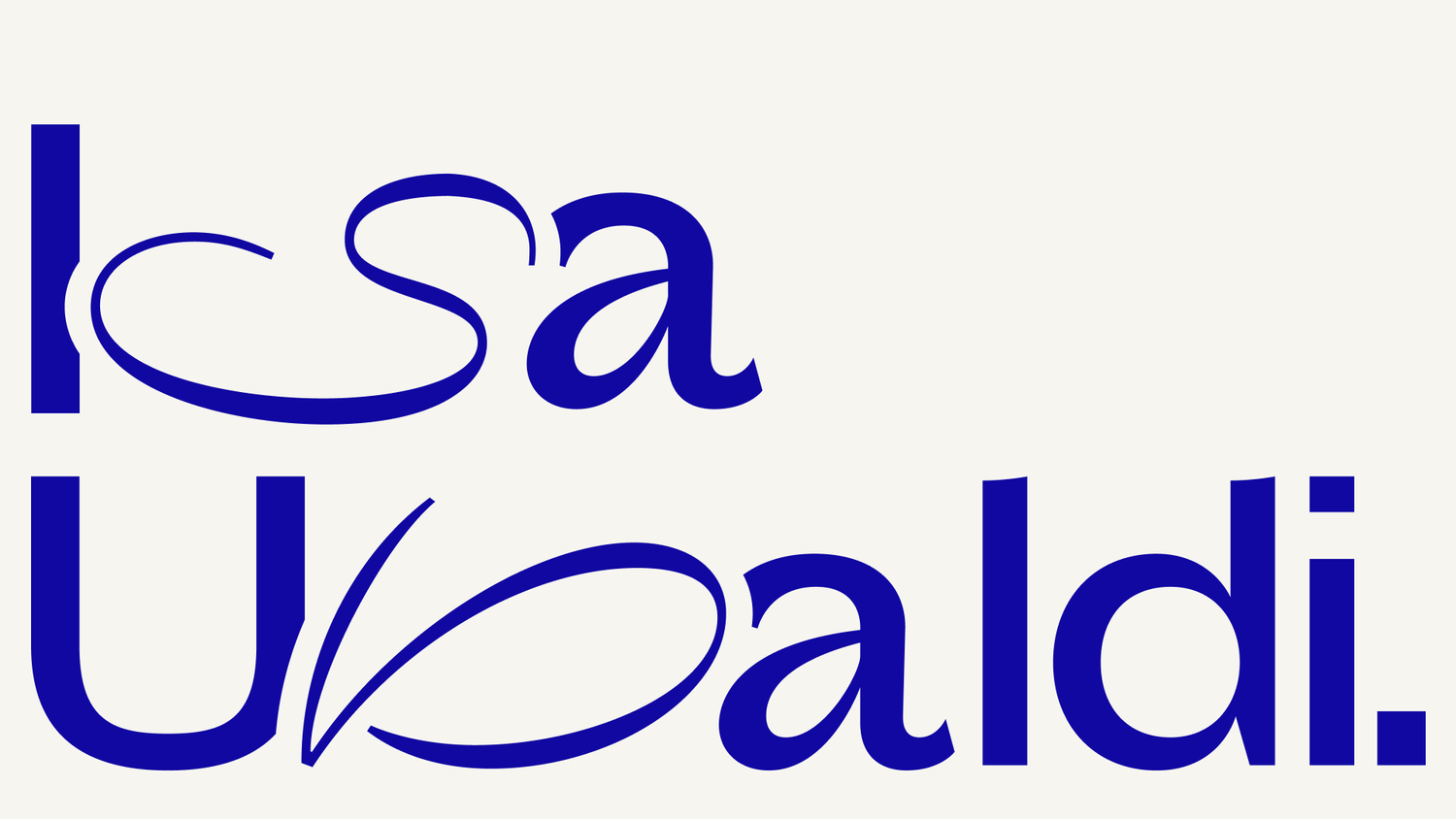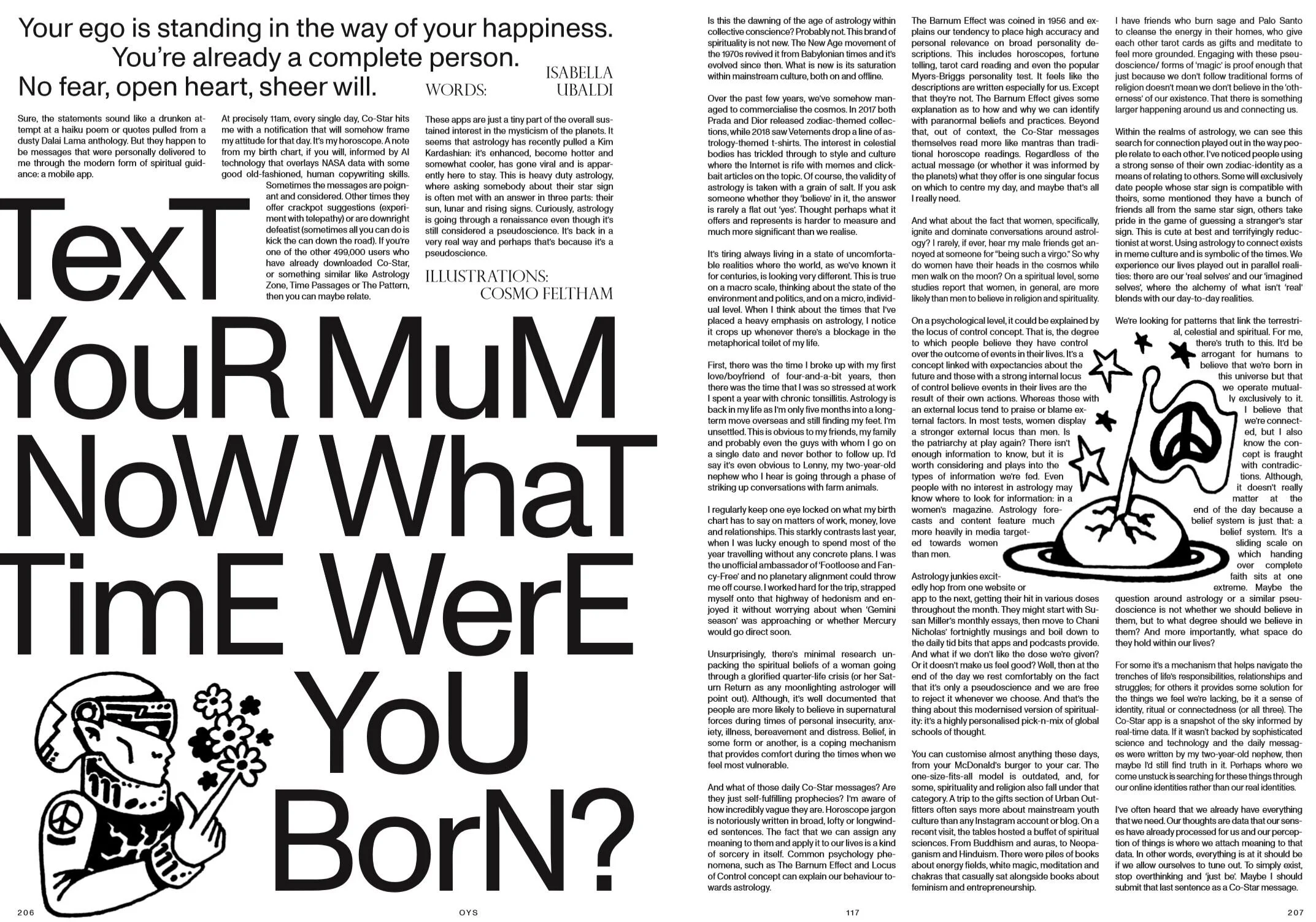I HEART BERLIN - GUEST AUTHOR FEBRUARY 2020
Hi Mum, Yeah Berlin’s Great! Someone Wanted to Pee On My Face
:)
OYSTER MAGAZINE #117: The Unreal Issue.
Text Your Mum Now What Time Were You Born?
Unpacking modern spirituality via internet astrology.
Your ego is standing in the way of your happiness.
You’re already a complete person.
No fear, open heart, sheer will.
Sure, the statements sound like a drunken attempt at a haiku poem or quotes pulled from a dusty Dalai Lama anthology. But they happen to be messages that were personally delivered to me through the modern form of spiritual guidance: a mobile app.
At precisely 11am, every single day, Co-Star hits me with a notification that will somehow frame my attitude for that day. It’s my horoscope. A note from my birth chart, if you will, informed by AI technology that overlays NASA data with some good old-fashioned, human copywriting skills. Sometimes the messages are poignant and considered. Other times they offer crackpot suggestions (experiment with telepathy) or are downright defeatist (sometimes all you can do is kick the can down the road). If you’re one of the other 499,000 users who have already downloaded Co-Star, or something similar like Astrology Zone, Time Passages or The Pattern, then you can maybe relate.
These apps are just a tiny part of the overall sustained interest in the mysticism of the planets. It seems that astrology has recently pulled a Kim Kardashian: it’s enhanced, become hotter and somewhat cooler, has gone viral and is apparently here to stay. This is heavy duty astrology, where asking somebody about their star sign is often met with an answer in three parts: their sun, lunar and rising signs. Curiously, astrology is going through a renaissance even though it’s still considered a pseudoscience. It’s back in a very real way and perhaps that’s because it’s a pseudoscience.
Is this the dawning of the age of astrology within collective conscience? Probably not. This brand of spirituality is not new. The New Age movement of the 1970s revived it from Babylonian times and it’s evolved since then. What is new is its saturation within mainstream culture, both on and offline.
Over the past few years, we’ve somehow managed to commercialise the cosmos. In 2017 both Prada and Dior released zodiac-themed collections, while 2018 saw Vetements drop a line of astrology-themed t-shirts. The interest in celestial bodies has trickled through to style and culture where the Internet is rife with memes and clickbait articles on the topic. Of course, the validity of astrology is taken with a grain of salt. If you ask someone whether they ‘believe’ in it, the answer is rarely a flat out ‘yes’. Though perhaps what it offers and represents is harder to measure and much more significant than we realise.
It’s tiring always living in a state of uncomfortable realities where the world, as we’ve known it for centuries, is looking very different. This is true on a macro scale, thinking about the state of the environment and politics, and on a micro, individual level. When I think about the times that I’ve placed a heavy emphasis on astrology, I notice it crops up whenever there’s a blockage in the metaphorical toilet of my life.
First, there was the time I broke up with my first love/boyfriend of four-and-a-bit years, then there was the time that I was so stressed at work I spent a year with chronic tonsillitis. Astrology is back in my life as I’m only five months into a long-term move overseas and still finding my feet. I’m unsettled. This is obvious to my friends, my family and probably even the guys with whom I go on a single date and never bother to follow up. I’d say it’s even obvious to Lenny, my two-year-old nephew who I hear is going through a phase of striking up conversations with farm animals.
I regularly keep one eye locked on what my birth chart has to say on matters of work, money, love and relationships. This starkly contrasts last year, when I was lucky enough to spend most of the year travelling without any concrete plans. I was the unofficial ambassador of ‘Footloose and Fancy-Free’ and no planetary alignment could throw me off course. I worked hard for the trip, strapped myself onto that highway of hedonism and enjoyed it without worrying about when ‘Gemini season’ was approaching or whether Mercury would go direct soon.
Unsurprisingly, there’s minimal research unpacking the spiritual beliefs of a woman going through a glorified quarter-life crisis (or her Saturn Return as any moonlighting astrologer will point out). Although, it’s well documented that people are more likely to believe in supernatural forces during times of personal insecurity, anxiety, illness, bereavement and distress. Belief, in some form or another, is a coping mechanism that provides comfort during the times when we feel most vulnerable.
And what of those daily Co-Star messages? Are they just self-fulfilling prophecies? I’m aware of how incredibly vague they are. Horoscope jargon is notoriously written in broad, lofty or longwinded sentences. The fact that we can assign any meaning to them and apply it to our lives is a kind of sorcery in itself. Common psychology phenomena, such as The Barnum Effect and Locus of Control concept can explain our behaviour towards astrology.
The Barnum Effect was coined in 1956 and explains our tendency to place high accuracy and personal relevance on broad personality descriptions. This includes horoscopes, fortune telling, tarot card reading and even the popular Myers-Briggs personality test. It feels like the descriptions are written especially for us. Except that they’re not. The Barnum Effect gives some explanation as to how and why we can identify with paranormal beliefs and practices. Beyond that, out of context, the Co-Star messages themselves read more like mantras than traditional horoscope readings. Regardless of the actual message (or whether it was informed by the planets) what they offer is one singular focus on which to centre my day, and maybe that’s all I really need.
And what about the fact that women, specifically, ignite and dominate conversations around astrology? I rarely, if ever, hear my male friends get annoyed at someone for “being such a virgo.” So why do women have their heads in the cosmos while men walk on the moon? On a spiritual level, some studies report that women, in general, are more likely than men to believe in religion and spirituality.
On a psychological level, it could be explained by the locus of control concept. That is, the degree to which people believe they have control over the outcome of events in their lives. It’s a concept linked with expectancies about the future and those with a strong internal locus of control believe events in their lives are the result of their own actions. Whereas those with an external locus tend to praise or blame external factors. In most tests, women display a stronger external locus than men. Is the patriarchy at play again? There isn’t enough information to know, but it is worth considering and plays into the types of information we’re fed. Even people with no interest in astrology may know where to look for information: in a women’s magazine. Astrology forecasts and content feature much more heavily in media targeted towards women than men.
Astrology junkies excitedly hop from one website or app to the next, getting their hit in various doses throughout the month. They might start with Susan Miller’s monthly essays, then move to Chani Nicholas’ fortnightly musings and boil down to the daily tid bits that apps and podcasts provide. And what if we don’t like the dose we’re given? Or it doesn’t make us feel good? Well, then at the end of the day we rest comfortably on the fact that it’s only a pseudoscience and we are free to reject it whenever we choose. And that’s the thing about this modernised version of spirituality: it’s a highly personalised pick-n-mix of global schools of thought.
You can customise almost anything these days, from your McDonald’s burger to your car. The one-size-fits-all model is outdated, and, for some, spirituality and religion also fall under that category. A trip to the gifts section of Urban Outfitters often says more about mainstream youth culture than any Instagram account or blog. On a recent visit, the tables hosted a buffet of spiritual sciences. From Buddhism and auras, to Neopaganism and Hinduism. There were piles of books about energy fields, white magic, meditation and chakras that casually sat alongside books about feminism and entrepreneurship.
I have friends who burn sage and Palo Santo to cleanse the energy in their homes, who give each other tarot cards as gifts and meditate to feel more grounded. Engaging with these pseudoscience/ forms of ‘magic’ is proof enough that just because we don’t follow traditional forms of religion doesn’t mean we don’t believe in the ‘otherness’ of our existence. That there is something larger happening around us and connecting us.
Within the realms of astrology, we can see this search for connection played out in the way people relate to each other. I’ve noticed people using a strong sense of their own zodiac-identity as a means of relating to others. Some will exclusively date people whose star sign is compatible with theirs, some mentioned they have a bunch of friends all from the same star sign, others take pride in the game of guessing a stranger’s star sign. This is cute at best and terrifyingly reductionist at worst. Using astrology to connect exists in meme culture and is symbolic of the times. We experience our lives played out in parallel realities: there are our ‘real selves’ and our ‘imagined selves’, where the alchemy of what isn’t ‘real’ blends with our day-to-day realities.
We’re looking for patterns that link the terrestrial, celestial and spiritual. For me, there’s truth to this. It’d be arrogant for humans to believe that we’re born in this universe but that we operate mutually exclusively to it. I believe that we’re connected, but I also know the concept is fraught with contradictions. Although, it doesn’t really matter at the end of the day because a belief system is just that: a belief system. It’s a sliding scale on which handing over complete faith sits at one extreme. Maybe the question around astrology or a similar pseudoscience is not whether we should believe in them, but to what degree should we believe in them? And more importantly, what space do they hold within our lives?
For some it’s a mechanism that helps navigate the trenches of life’s responsibilities, relationships and struggles; for others it provides some solution for the things we feel we’re lacking, be it a sense of identity, ritual or connectedness (or all three). The Co-Star app is a snapshot of the sky informed by real-time data. If it wasn't backed by sophisticated science and technology and the daily messages were written by my two-year-old nephew, then maybe I’d still find truth in it. Perhaps where we come unstuck is searching for these things through our online identities rather than our real identities.
I’ve often heard that we already have everything that we need. Our thoughts are data that our senses have already processed for us and our perception of things is where we attach meaning to that data. In other words, everything is at it should be if we allow ourselves to tune out. To simply exist, stop overthinking and ‘just be’. Maybe I should submit that last sentence as a Co-Star message.


